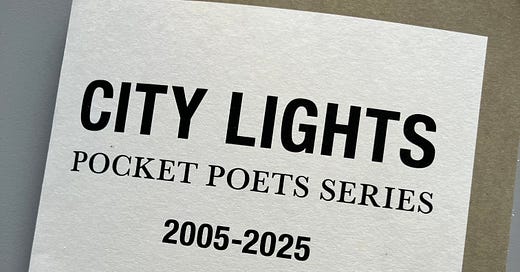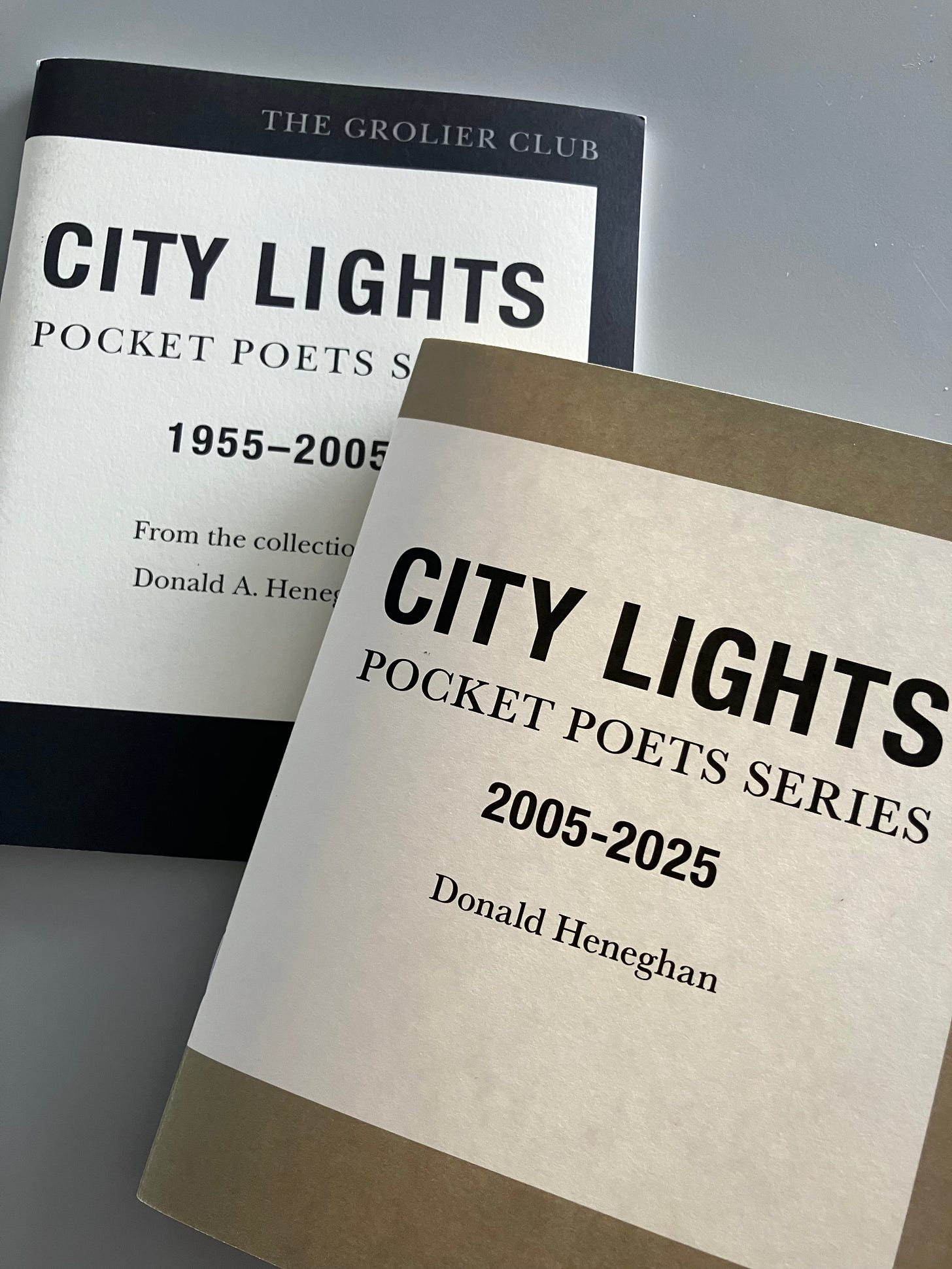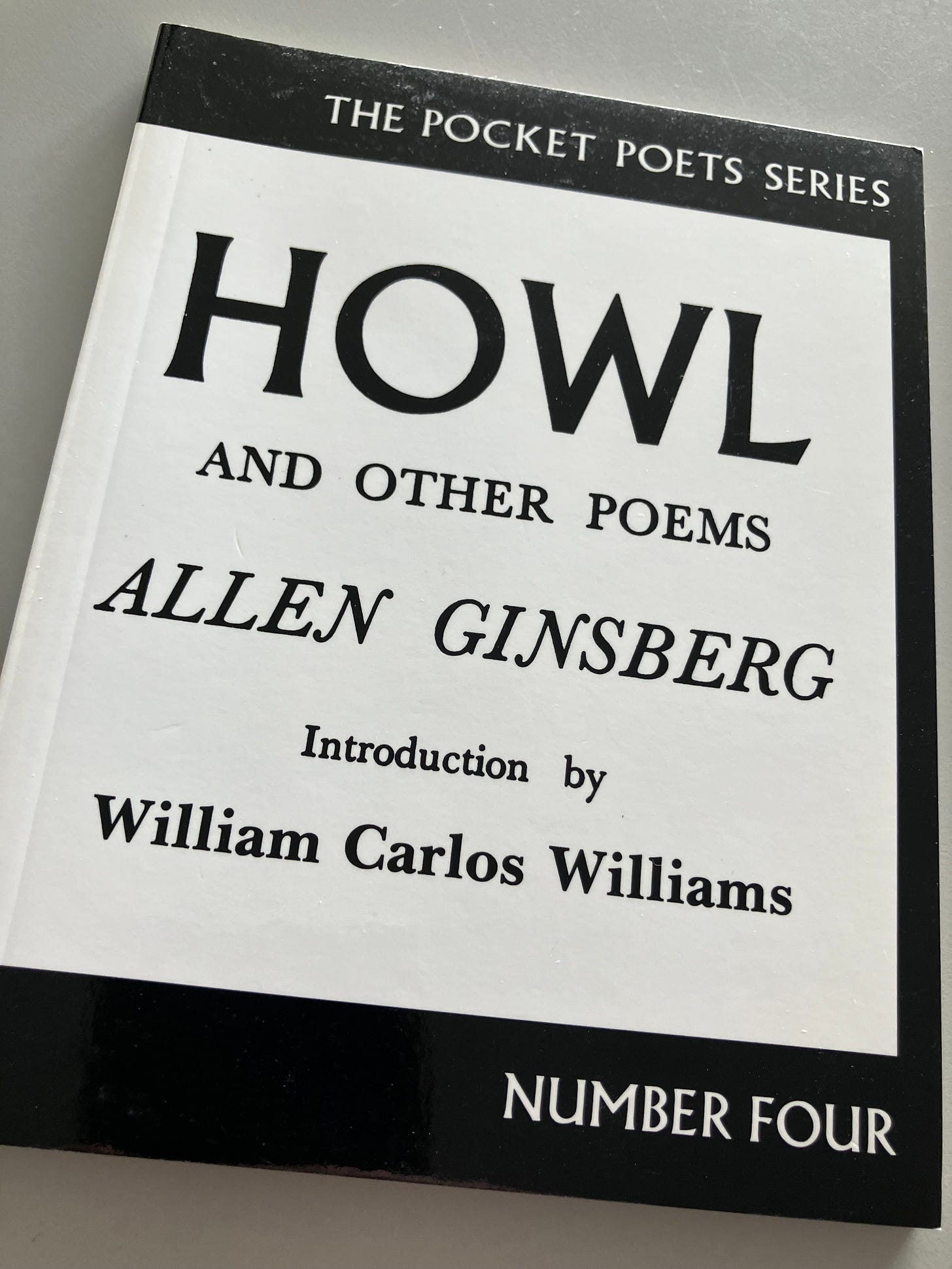City Lights: Pocket Poets Series, 2005-2025 by Donald Heneghan (Maze Books, 2025); City Lights: Pocket Poets Series 1955-2005 by Donald A. Heneghan (The Grolier Club, 2005)
By Jonah Raskin, Chief Book Reviewer
LAWRENCE Ferlinghetti used to complain to me that newspapers and magazines didn’t review poetry readings. For the most part they didn’t in his lifetime. They still don’t, not unless the reading is a mega-event with international stars, or a groundbreaking reading such as the one that took place at the 6 Gallery in 1955 when Ginsberg read a part of ‘Howl’. Richard Eberhart reviewed that event for the New York Times and rightly so. His report was titled ‘West Coast rhythms’.
It provided readers with news from the world of poetry and from the wider world of culture. Bravo Eberhart and the New York Times. But it’s nearly impossible now to review on a daily or a weekly basis poetry readings in San Francisco. There are so many of them at so many different venues, some of them not publicised. It's hard enough getting books of poetry reviewed in newspapers and magazines unless the poet is famous.
Yes, fame matters in the world of poetry as it does in the world of fiction and non-fiction. I was once told by a poetry editor at City Lights that I wasn’t famous enough to be published. Of course most poets are not famous when their first books are published. That was true for many of the poets, such as Ferlinghetti, Ginsberg, Kenneth Rexroth and Kenneth Patchen, who were the first five poets to be published in the innovative ‘Pocket Poets Series’ by City Lights.
I was thinking about this rather obscure publishing history recently in San Francisco where I live, not far from City Lights, when two small books arrived in the mail. Two very small books. The titles of the books and the font for the titles initially confused me. They might also confuse others.
That could be intentional. Readers might take them for books from City Lights, now run by Elaine Katzenberger, who wandered into the store years ago from Vesuvio, the café on one side of Jack Kerouac Alley that runs along an outer wall of the bookstore in North Beach where space is at a premium.
One book inside the envelope was titled City Lights: Pocket Poets Series, 1955-2005 (The Grolier Club). It was published in conjunction with an exhibit held in 2005 in New York at the Grolier Club which calls itself ‘America’s oldest society for book lovers and graphic arts lovers’. The second volume was titled City Lights: Pocket Poets Series, 2005-2025 (Maze Books). No address is provided for either book. Where would one purchase them, one wonders?
Both books boast on the cover the name Donald Heneghan, which did not immediately leap out at me. The more recent of the two books offers a quotation from Lawrence Ferlinghetti who wrote, ‘So may our little cultural exchange program continue into the 21st century in a world without walls in which poetry is still the best news’. Ferlinghetti was probably recycling William Carlos Williams’ observation that ‘poetry is news that stays news’.
The quotation from Ferlinghetti is offered in Heneghan’s ‘Introduction’ to the second of his two volumes in which he explains how, where, when and why he and Jennifer Cushing met Ferlinghetti in 2001 and laid out their plans ‘to collect each issue in the Pocket Poets Series and write a brief piece on each book to trace the history and importance of each volume and the series as a whole’ (Cushing is never identified). One wonders why she is even mentioned. Unfortunately, Heneghan does not trace the importance of many of the volumes, including Anne Waldman’s Fast Speaking Woman and Peter Orlovsky’s Clean Asshole Poems & Smiling Vegetable Songs, to name just two.
As I’ve suggested, the two books that came in the mail looked like they might have been part of the long running series that Lawrence Ferlinghetti launched in the 1950s and that ran throughout the twentieth century and that have continued after Ferlinghetti’s death at 101 in 2021. The two books, I learned by opening the books and turning the pages, were not actually from City Lights in San Francisco. They were from the aforementioned Donald Heneghan, who was born in Alton, Illinois, the birthplace of jazz great Miles Davis. Heneghan added that, ‘All roads lead to Kerouac.’
Pictured above: Ginsberg’s Howl and Other Poems, an early edition in the Pocket Poets Series
Ferlinghetti’s road to Kerouac was indirect. He didn’t publish Kerouac until 1971, two years after the novelist died at the age of 47. Heneghan writes that the City Lights collection of Kerouac’s Scattered Poems was compiled by biographer Ann Charters. When I asked Ferlinghetti what if anything he regretted when he was at the helm of City Lights, he said, ‘I wish I had published Kerouac a lot sooner than I did.’ On the Road had appeared in print 14 years earlier.
Had Heneghan ripped off City Lights? I wondered when I saw the look-alike cover? Had he violated copyright? No, he had not. His covers are not exact copies of the volumes in the Pocket Poets Series. They are, as Heneghan himself points out, ‘homages’.
Heneghan might well be called an aficionado of City Lights Bookstore and Publishing Company and especially the Pocket Poets Series which has delighted poets, readers and writers for more than half-a-century. The business at 261 Columbus Avenue is now known as ‘City Lights Bookstore' and not ‘Bookshop’. How and why did the ‘shop’ become the ‘store’, one wonders? No answers here.
The compiler here does know a thing or two or three about the series and the authors, though he is not, on the evidence of these books, a bibliophile or a bibliographer. He is strictly an amateur, which is to say that his books are a labour of love not of significant research or scholarship. Still there’s a lot to be said for amateurs rather than professionals. Amateurs do something out of love, not a desire to profit or to be famous (The English word ‘amateur’ comes from French the amateur, ‘one who loves, lover’).
Heneghan is good with numbers. The books in the Pocket Poets Series measure 15.5 x 12.5cm, with slight variations, he explains. Ferlinghetti’s Pictures of the Gone World was published in 1955, with 500 paperback copies and 25 hardback copies. Heneghan writes that, since 2005, only seven new poets have been published in the series. Why that is? He doesn't say.
Nor does he point out that City Lights began by publishing mostly white male poets –Ginsberg, Patchen, Rexroth, Ferlinghetti, Williams, Corso, Duncan – and an occasional woman (Levertov, Ponsot) and that it has, over the past few decades, published more women poets and poets of color.
Heneghan writes that Ginsberg composed ‘Howl’ in San Francisco; in fact he wrote it in Berkeley and in San Francisco. He writes that Ginsberg won the National Book Award for poetry in 1974. In fact he shared the award with Adrienne Rich. Heneghan points out that Diane di Prima worked with LeRoi Jones, but neglects to say that Jones changed his name to Amiri Baraka.
He writes that ‘many consider “Howl” the “most significant poem since Whitman’s “Leaves of Grass”.’ But that leaves out T. S. Eliot’s The Waste Land, the most significant poem in English published in the first-half of the twentieth century.
Heneghan might have pointed out that Tongo Eisen-Martin, who is published by City Lights, was, from 2021 to 2024, the poet laureate of San Francisco and an African American. The details matter. I wish Heneghan had taken more care with the information he presents.
In his ‘Introduction’ to volume two, Heneghan explains that he met Shig Murao’s nephew in Chicago, that it was a ‘notable’ event and that Shig’s nephew told him, ‘We always wondered what my uncle did at that bookstore.’ But there are no details or stories about the pivotal role that Shig played, except that Heneghan says he was the ‘manager’ and was arrested with Ferlinghetti. Poor Shig. He has rarely if ever received the recognition he deserves. Donald Heneghan missed a rare opportunity. Other opportunies have also gone by the wayside.






As a teenager I picked up Reality Sandwiches at Shakespeare and Company in Paris. It changed our lives. Mary and Claude and I moved to San Francisco that fall. I guess that shows how effective the Pocket Series can 8.
While Kerouac wasn't published in the City Lights Pocket Poets series until 1971, Ferlinghetti did published a truncated version of his Book of Dreams in 1961.